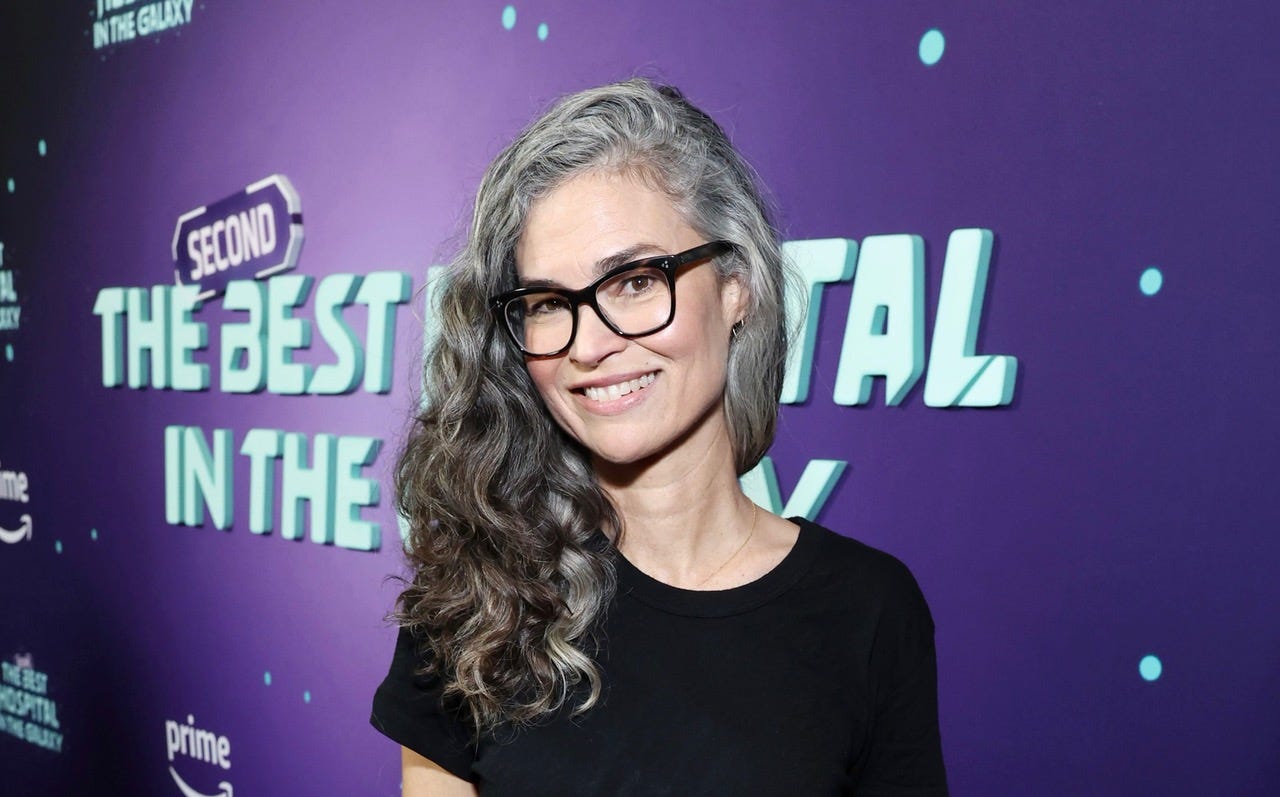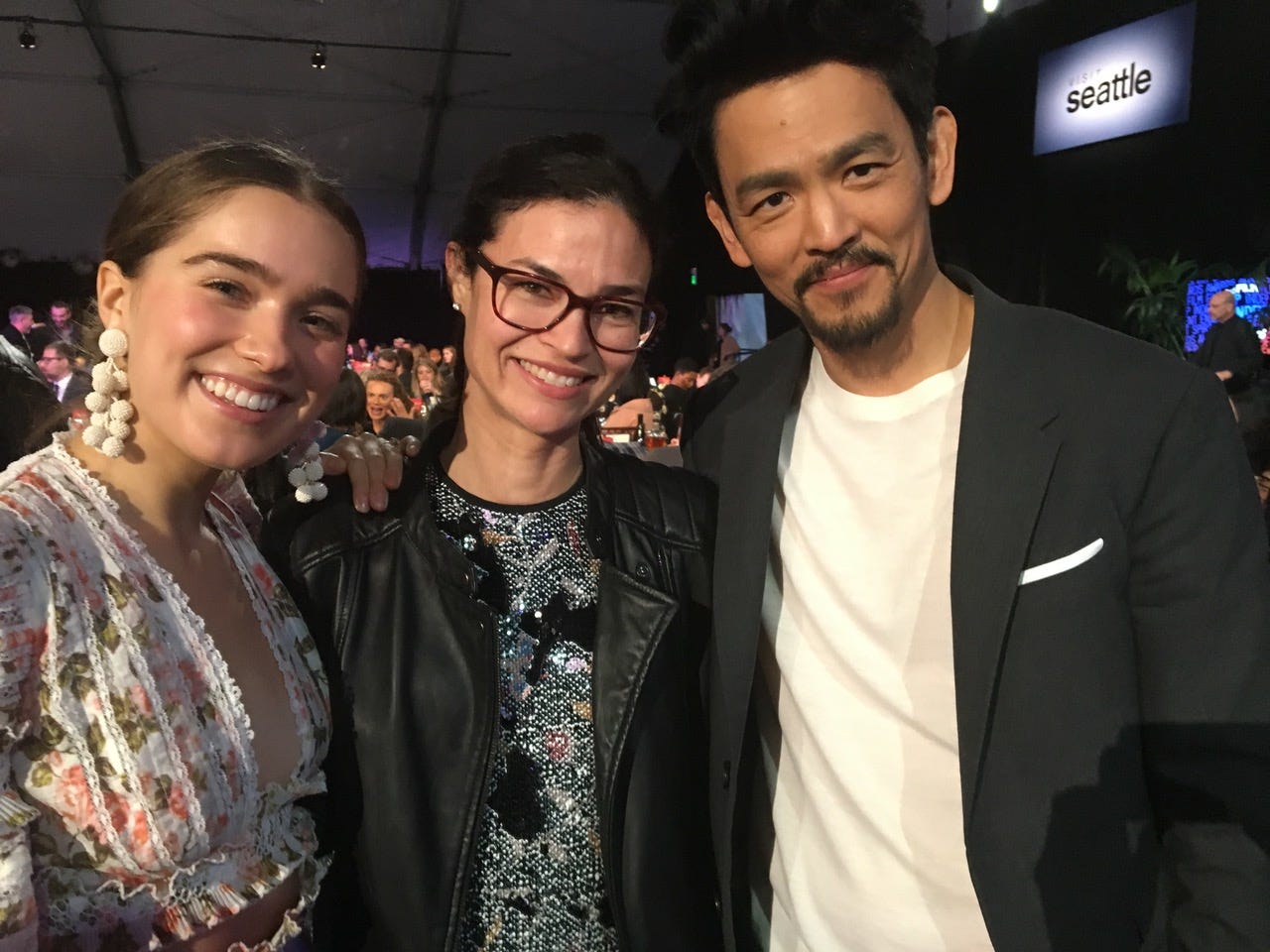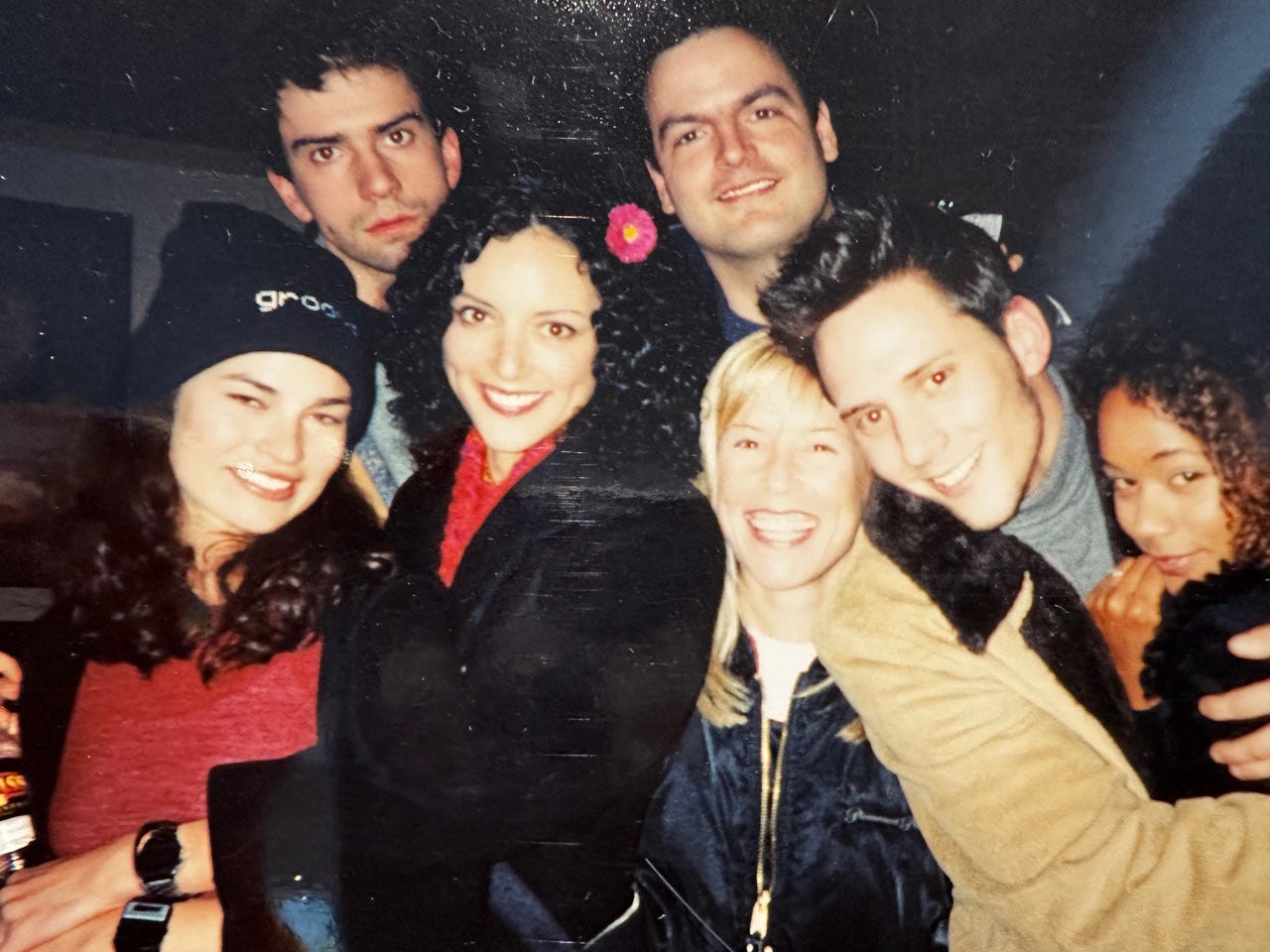From Sundance to Streaming: Danielle Renfrew Behrens on Navigating the New Hollywood
By Rebecca Green
After making her mark in independent film with breakout hits such as GROOVE and THE QUEEN OF VERSAILLES, producer Danielle Renfrew Behrens made an unexpected pivot to television when she joined forces with Maya Rudolph at Banana Split. With 10 Sundance premieres and credits ranging from grassroots documentaries to major motion pictures, Danielle sat down with Dear Producer to discuss her transition from indie film producer and financier to TV producer, the harsh realities facing independent filmmakers in today's market, and why she believes the traditional paths to becoming a producer may no longer exist. Danielle offers a candid look at how personal relationships and adaptability have become essential survival tools in an industry where the rules keep changing.

You're now partnered with Maya Rudolph at your company at Banana Split, but you started at Animal Pictures with both Natasha Lyonne and Maya. Before joining forces, your background had been indie features so how did the opportunity to work with them in television come up?
For context, in 2016, I launched Superlative - a film fund and production company. At that point, I had a lot of success making good films for very little money and selling them at markets like Sundance. I went from raising money project to project to raising a pool of money that I could deploy instead. For the first time, I was able to work on more than one film at a time and it also provided me more flexibility and control over my schedule which I needed with two young kids. I thought I had finally cracked the code on how to have a sustainable career in indie film as a working mom and then everything changed with Netflix and Amazon moved away from acquisition to producing films themselves.
A few years into running Superlative, I reconnected with an old friend from high school Maya Rudolph at Christos Konstantakopoulos’ Oxbelly Filmmakers Lab in Greece. Initially we discussed doing a feature together - an improv based film I thought we could do independently, but that conversation unexpectedly shifted when she asked if I’d be interested in helping her launch a production company.
For me, it came at a great moment. As much as I was a die-hard indie film person, I was intrigued by television. Producers I had come up with in indie film were having a lot of success in TV and seemed to be enjoying it. For example, Gina Kwon was an exec at Amazon, Andrea Sperling was producing TRANSPARENT - there was a lot of crossover and the worlds no longer seemed bifurcated.
Initially, it seemed like a unique (maybe odd!) choice to have an indie film person run a company that was planning to focus on TV. But ultimately, it was a sensibility fit, and there was a level of trust that already existed. We were also hoping to produce documentaries and features in addition to TV so in that way it made sense.
I thought it would be an interesting new challenge but I was surprised by how much I enjoyed it. I was used to working on my own often in quasi-isolation and now, I had these very smart and dynamic partners. We had all been working for 20+ years so we had a lot of collective experience and relationships we were able to leverage.
Did you feel there was a big learning curve moving from indies to TV?
At first, it was nerve-wracking with some imposter syndrome, but what I quickly realized was that at its core, my job was the same as it ever was. I was supporting creative people and trying to help facilitate their vision, whether that means protecting them from outside forces or sometimes getting them out of their own way. And I’ve always built bridges between the creative and financiers. Instead of the high net worth individuals I was used to on indie films, now I was working with studio and network execs but the dynamic was similar. Writing on television is group sport so that was a little bit of a shift too but in general, the showrunner holds the vision much like the writer/director does in indie film.
The company was quite successful right out of the gate with POKER FACE and LOOT, how did that happen?
We launched the company during peak TV, and through our relationships, we were able to build a pretty strong slate fairly quickly. We had a lot of projects in very early stages of development when Covid hit so we were able to continue moving forward when production came to a halt. The second season of our animated show THE SECOND BEST HOSPITAL IN THE GALAXY just launched on Amazon this April and that was something we pitched in August of 2019 and we just wrapped the third season of LOOT which we initially started working on in 2021.
Was it hard to earn the trust of the studios at the start?
Being partnered with talent, I’ve found the network and studios often assume you don’t have any production experience. And unlike the feature world, a lot of the people with producer credits are actually writers with little to no on-set experience. Coming from indie film, I have been hands-on in every aspect of production from giving creative notes to crewing up and overseeing the budget so I think our execs were pleasantly surprised that I could actively problem solve and find creative solutions when things came up.
Feature people tend to want to get into TV, and TV people say they miss the feature space. Do you feel a yearning to go back to features?
Yes - I would love to do another feature soon! There is something satisfying about making a complete meal - one with a clear beginning, middle, and end. There’s a dark cloud over our business right now and I think I have this fantasy that getting a film going will somehow be easier than getting another series greenlit. Even in the best of times, it’s never easy to get something going, but it’s tough right now. There’s a lot of fear in the industry and a high level of risk aversion.
If you were still funding indie films today, what would your approach be?
If I was financing now, I would focus more on development than production. It’s very risky, but the outlay of cash is less, and you keep your options open. You can finance the development of a project and then you have the choice to either attempt to set it up at the script stage or stick with independent financing for production and try to sell it as a finished film. In the past, if you made a quality film on a shoestring budget, you had a very good chance of recouping your investment and making a profit. Now, all bets are off.
For most of my career, I was working independently on modestly budgeted films. I was able to support myself and stay independent. That would be almost impossible now.
So are you saying emerging producers should be looking to work with talent, like you’re doing now, or with financiers, or production companies rather than trying to build a solo career?
If I were just starting out and knew I wanted to be a producer, I would go to a production company and try to get an entry level job. I would get a foot in the door with someone already established. When I was starting out, it was different. There was enthusiasm around indie films and a market for them, so there were more points of entry. Right now, it seems impossible to break in just by making a couple short films or a low budget indie.
Ten years ago, my advice was the exact opposite - I’d encourage people to jump in and make things and carve out their own path and not “wait for permission.” I always say I got in through the back door, but I don't think there's a back door anymore.
What was the entry point into your first feature GROOVE?
GROOVE really changed things for me. At that point, I was 25 working at a nonprofit production company in San Francisco producing social issue documentaries. I was at a crossroads - I had just directed my first short documentary (which Maya actually did the voiceover for) and I was thinking about applying to film school. It was around this time I met Greg Harrison, an editor, who had written a script about the rave scene that he wanted to direct.
GROOVE really appealed to me because although it was scripted, it felt very authentic to what was going on in San Francisco at the time. It felt documentary-adjacent and we approached it that way. We populated the cast and crew with people who were from the scene. The art department hadn’t done movies before - they actually did raves and all of the DJs featured in the film were real DJs. GROOVE was Hamish Linklater’s first movie and we also had Nick Offerman (both of whom came from theater), but many of the actors weren’t professionally trained.
On the business side, Greg and I were very ambitious. We put together a business plan and thought we'd be shooting in six months. Ultimately, it took over a year to raise $250,000 which was just enough to shoot the film and get us to a rough cut. We mailed a VHS tape to Sundance (yes a VHS tape!). Once the film was accepted, we were able to raise finishing funds quickly. As an aside, I would never recommend that anyone start shooting without enough money in the bank to get them through post. This was the first and last time I ever did that and fortunately, I wasn’t caught out.
What about that experience made you want to do it again?
I lived the quintessential Sundance dream. There was a bidding war - we were up all night negotiating. GROOVE was the first film to sell that year at Sundance. We got invited to parties, we made money, our investors made money, and we even featured in the New York Times. Coming from San Francisco, we didn’t understand how the business worked and how rare this experience was. Of course, I was hooked!
You've also produced some really great documentaries. I have a memory of being on the same flight as you, I think coming home from Sundance in 2012, when Lauren Greenfield’s THE QUEEN OF VERSAILLES premiered, but someone was trying to get the film pulled from the festival lineup?
It was wild! David Siegel, the subject of the doc, was suing not only the filmmaker, but also Sundance in an effort to get them to pull the film which was set to premiere on the opening night of the festival. It was ultimately a first amendment right issue and Sundance did not acquiesce. David was dealing with lawyers as his wife Jackie Siegel was in Park City walking the red carpet at the film’s premiere. Now more than ten years later, the film has been adapted into a musical and is opening on Broadway soon with Kristin Chenoweth and F. Murray Abraham as Jackie and David Siegel.
Speaking of Broadway… Let's talk about WAITRESS, which you executive produced. In my eyes (and from a box office perspective) it's one of the all-time greatest indie movies and became a huge broadway musical success story. How do we as producers make sure we're part of these ancillary opportunities?
When I was negotiating my deal on WAITRESS, I never could have imagined it would be adapted into a musical. Now that you’re seeing that happen more and more and films being adapted into series, etc., it’s important to have any potential for future value contemplated into the backend definition.
You've filled so many different shoes in your career, where do you feel most valued or most useful on a project?
I enjoy solving problems and bringing people together. I understand a filmmaker’s passion and commitment to a particular location or shot, and I also appreciate the pressure that the line producer might be under to bring the budget down. I can help prioritize and find a middle ground. My goal is to remind people that we’re ultimately all on the same team. Even when I was financing, I always thought of myself as a director’s producer. Protecting the initial vision that got you excited in the first place is always hands-down the most important thing. Still, I genuinely believe you can do that without ignoring the economic realities.

Looking at your filmography with COLUMBUS, WAITRESS, THE QUEEN OF VERSAILLES, and so many others, you have such an eclectic filmography. Is there any through-line you can pinpoint?
I don't think there's a thematic link in the projects I’ve produced. I think it's more about my belief in and connection to the filmmakers. That's what inspires me and keeps me enthusiastic - it’s as important if not more so than the subject matter or the script. I’ve been able to identify filmmakers and up and coming talent who are really special - people like Kogonada, Sammi Cohen and Dominique Fishback. Seeing their careers flourish is very fulfilling to me - knowing I’ve had a part in supporting them and carving out space for them to do something creative without a lot of corporate interference. For example, I produced and financed Kogonada’s directorial debut, COLUMBUS, which was a very beautiful film albeit not overtly commercial. Building on that film, he was able to make AFTER YANG and now he has A BIG BOLD BEAUTIFUL JOURNEY coming out soon with Colin Farrell and Margot Robbie. Every time I see an ad for it, I smile. I’m not involved in that film but I'm very proud that I was a part of Kogonada’s trajectory as a filmmaker.



